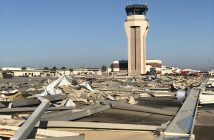By Sherri Goodman and Greg Douquet
Former Secretary of Defense Don Rumsfeld famously said you go to war with the army you have, not the army you want.
Fortunately, the army we have is ready to go to war against a new enemy: the rapidly spreading coronavirus that poses a grave danger to our neighbors in all 50 states.
When America recruits young men and women to join the military, we offer them a chance to see the world while protecting our country.
But now, our forces are being tasked with protecting the home front and deploying for the largest domestic humanitarian assistance and disaster relief mission our nation has faced since 9/11.
We are asking our military to take on new missions in the domestic public health domain that would have been unthinkable just a few years ago.
The National Guard has already been called up in New Rochelle, the early epicenter for the virus in the state of New York, and New York Governor Andrew Cuomo asked President Trump to direct the Army Corps of Engineers to leverage its expertise, equipment, and personnel to power, retrofit and equip existing facilities — such as military bases or college dormitories — to serve as temporary medical centers.
Some New Rochelle residents, already on edge as they were among the first in the nation to face a quarantine, were worriedabout the New York National Guard being called into theircommunity.
Making matters worse, state and local officials did so little to prepare residents for what was, for many, their first real encounter with the military.
As the National Guard arrived to establish a “containment zone, fears of a ‘New Rochelle refugee camp’ and concerns about open ended isolation washed over the community.
The lack of clear, strategic messaging stoked anxiety and possibly manifested in some questionable decisions about whether to stay and ‘ride out’ the crisis or escape and risk becoming open ended vagabonds.
But, despite community worries, on day one of the New YorkNational Guard’s deployment to New Rochelle — March 13 — only seven guardsmen arrived.
On the second day, they established two checkpoints in and out of the quarantined zone. Since then, the guardsmen have manned their post, bluntingfurther spread of the virus locally.
The checkpoints haven’t been onerous nor overly time consuming—about 10 minutes with traffic.
The guardsmen ask a few salient questions designed to contain the virus, offer basic information about the purpose of the checkpoints and status of the quarantine, and generally symbolize that the state of New York is providing support to the citizens of New Rochelle in the form of their fellow New Yorkers who serve in the National Guard.
New Rochelle residents are seeing our military firsthand and learning what they can do under these dire conditions.
First, they provide security, to ensure that people are appropriately separated from those already diagnosed with COVID-19.
Second, they deliver logistics and necessities, from food and water, to emergency generators and ventilators.
Third, they provide emergency response services, such as transporting the ill to the appropriate medical facilities. And finally, they can provide basic health services, although limited by the lack of testing and treatment available across the nation.
And there’s more the military could do during this period of national emergency.
Governor Cuomo had it right when he counseled the President to direct the Army Corps to build expanded medical facilities to treat a growing number of Americans affected by COVID 19.
The Army Corps and the many American businesses with which it contracts and seeks supplies, could retrofit and power existing facilities, including military bases, campuses and elsewhere, some of which have excess buildings.
This act alone would stimulate the economy, in a microcosm of the unprecedented World War II mobilization effort that harnessed American factories to manufacture the weapons of that war – planes, tanks and ships.
While the weapons of this war are entirely different – medical tests, treatment, and secure facilities – our economy will be re-energized by having a clear plan with articulated goals.
While the US military cannot single-handedly save us from the spread of coronavirus, the model established by the New York National Guard in helping the citizens of New Rochelle manage through a time of great uncertainty and imminent health risk should be replicated in all 50 states during this pandemic.
Doing so will put us on a path towards “flattening the curve” of the disease spread so that our civilian medical community and emergency services, can get on with their job of getting America back on its feet.
Sherri Goodman served as the first deputy undersecretary of defense (environmental security) and was founder and executive director of the Center for Naval Analyses Military Advisory Board, whose landmark reports include Advanced Energy and US National Security (2017) among others. Goodman serves on the boards of the Atlantic Council and the Center for Climate & Security.
Greg Douquet is a former Marine Corps colonel, co-founder and managing Partner of Red Duke Strategies, LLC, and co-director of the Atlantic Council Global Energy Center’s Veterans Advanced Energy Project.




